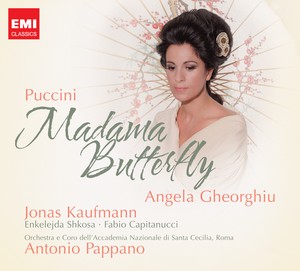|
|
|
|
|
|
|
|
| Opera Now, January 2009 |
| George Hall |
EMI's new recording of Madama Butterfly stands up well to
comparisons with its illustrious predecessors
|
Puccini: Madama Butterfly
|
|
|
 Puccini's
Japanese tragedy has been recorded complete numerous times over the last 87
years, reflecting its huge and ongoing status as one of the world's most
popular operas. Any new recording has, inevitably, a lot to live up to,
since several of the major sets have acquired a classic status and remain in
the catalogues decades after they were first released. Among those regularly
cited as outstanding interpretations of the piece are the two led by Spanish
soprano Victoria de los Angeles (1954, 1960); another two with Renata Scotto
as the protagonist, especially the first (1966); the first of two with
Mirella Freni in the lead (1978); and the single set with Maria Callas as
Cio Cio San (1955). An earlier set with Toti Dal Monte in the lead and
Beniamino Gigli as Pinkerton (1939) also has its admirers, despite more
limited sound. Puccini's
Japanese tragedy has been recorded complete numerous times over the last 87
years, reflecting its huge and ongoing status as one of the world's most
popular operas. Any new recording has, inevitably, a lot to live up to,
since several of the major sets have acquired a classic status and remain in
the catalogues decades after they were first released. Among those regularly
cited as outstanding interpretations of the piece are the two led by Spanish
soprano Victoria de los Angeles (1954, 1960); another two with Renata Scotto
as the protagonist, especially the first (1966); the first of two with
Mirella Freni in the lead (1978); and the single set with Maria Callas as
Cio Cio San (1955). An earlier set with Toti Dal Monte in the lead and
Beniamino Gigli as Pinkerton (1939) also has its admirers, despite more
limited sound.
But today's leading singers and conductors also deserve the opportunity to
place their conceptions of such major works on disc, and EMI's new
Butterfly, led by Angela Gheorghiu's protagonist, is to be welcomed. Taken
as a whole, there's certainly a great deal to admire in the result.
Recorded in Rome, with the Orchestra of the Accademia Nazionale di Santa
Cecilia under its music director, Antonio Pappano, the set registers in
first-class sound, with the score's wide range of colour and dynamic caught
in detail as well as presented in a spacious overall acoustic. In few
previous versions does the sheer brilliance of Puccini's magnificent
orchestral writing seduce the ear as here.
Part of this highly successful aspect can be ascribed to the loving
conducting of Pappano himself, a musician who seems to be able to enter into
the spirit of the wide variety of composers he performs with remarkable
sympathy and understanding. No other conductor today is as persuasive a
Puccini interpreter as he, relishing as he does both the brash 'masculine'
elements of the writing as well as the 'feminine' sensitive aspects. He
certainly gets close to the standards set by Barbirolli in the 1966 Scotto
recording, also made in Rome (at the Teatro dell'Opera), and in Karajan's
two versions.
The title role is one of the great challenges, vocally and interpretatively,
for a soprano voice combining the sheer beauty of a lyric instrument with
the weight of a spinto. On record, at least, Angela Gheorghiu offers what is
required. She also has a good sense of Puccinian style. Two things are
lacking. Her 15-year-old child bride of the first act sounds much the same
as the maturing adult of the rest of the opera; most of her great
predecessors (especially Dal Monte and Callas) make a significant difference
in the kinds of sounds they deploy to differentiate them. Secondly, and more
crucially, hers is a far more generalised approach than many, not engaging
with the text in the moment-by-moment way that the singers mentioned above
do. The result, ultimately, is less involving.
The discriminating tenor Jonas Kaufmann sings a very fine Pinkerton, a
touch baritonal in quality but none the worse for that. What he does lack,
inevitably, is the Italianate quality that artists like Gigli, Carlo
Bergonzi and Pavarotti have brought to the role - an American, admittedly,
but most effectively sung with a Latin dynamism and impetuousness contained
within the tone itself. His is nevertheless a highly intelligent and stylish
reading.
There is strong support from an emotionally committed Enkelejda Shkosa in
the crucial role of Suzuki from and from Fabio Capitanucci as a perceptive
and three-dimensional Sharpless. In smaller assignments, Gregory Bonfatti
presents a plausible rogue of a Goro and Raymond Aceto is a terrifyingly
authoritative Bonze. |
|
|
|
|
|
|
|
|
|
|
|
|
|
|
|
|
|
|